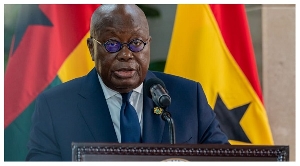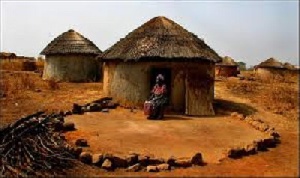- Home - News
- TWI News | TV
- Polls
- Year In Review
- News Archive
- Crime & Punishment
- Politics
- Regional
- Editorial
- Health
- Ghanaians Abroad
- Tabloid
- Africa
- Religion
- Election 2020
- Coronavirus
- News Videos | TV
- Photo Archives
- News Headlines
- Press Release
Opinions of Thursday, 10 May 2012
Columnist: Owusu, Stephen Atta
Five Cows for a Wife? Ghana Marriage Customs in a Limbo!
Abdul lived in the United States for ten years and decided to travel to his hometown in the Upper East region to marry his old girl-friend. When he got to Bawku, his hometown, he told his parents the reason for his visit. They immediately went to see the parents of Abdul's girl-friend. Abdul was to provide five huge cows as bride price. In addition, he was to present to the woman a portmanteau filled with clothing, toiletries and jewels. The marriage would be crowned with a glamorous party inviting people in the community to attend, all on Abdul's account. Abdul never thought of such a huge expenditure in return for a wife. He left. While in the US, he got married to a white woman and he didn't have to pay any bride price.
In another scenario, John Afrifa, a young Accountant from Asante Mampong, had lived with his girl-friend, Annie, for two years. He took a decision to formally take the woman as a wife. According to Asante custom, Afrifa and three relatives went to Annie's parents to ask for her hand in marriage. The marriage came on and Afrifa paid the agreed bride price of 1000GhC, presented to his wife a luggage full of Dutch wax prints and Jewels. He also paid the "akontagyesika" (money for the brother-in-laws) and the necessary schnapps that the elders love so much.
It has become increasingly difficult for young men to get married due to general poverty and unemployment. The high bride price and the cost of marriage have prevented many from choosing a wife. Young couples living together (the so-called cohabitation) are becoming common in Ghana because the boys are scared of the financial costs of making a commitment. Women who are eager to marry, contribute part of the bride price to what her husband-to-be has. These women also fill a luggage with their own clothes and jewels in order to save the man's face. When women contribute financially and materially to the marriage process, it no longer becomes bride price but dowry as practised in India. Bride price is the amount of money, property or wealth paid to the parents of a woman for the rights to marry their daughter. Dowry, on the other hand, is money or property brought by the woman to the marital home. I don't know of any tribe in Ghana that demands a dowry. Dear, reader, do you know of any? If so, which tribe?
In Ghana today about six out of ten women bring forth babies out of wedlock. So many children abound without legitimate fathers. Due to expensive bridal price, many men have found ways to circumvent it, such as giving presents to the girl's parents, who in the process accept the relationship as normal. Marriage has become a difficult thing for Ghanaian men to contract. There are many Ghanaians abroad who detest the idea of paying five to ten cows or very expensive bride prices for a wife when they know they can marry white women without paying a cent. Usually the parents of the white women take over all the expenses of the marriage even to the extent of buying suit for the man during a wedding. Why should a Ghanaian young man travel all the way to Ghana to marry at such huge cost when he can get one almost for free where he is currently staying? Why go through the trouble of getting visa for the woman and even paying her air fare so that she can join you abroad?
Our customary marriage traditions have become outmoded. As a result many tribes have agreed to reduce bride prices. In this age of equality, many men are wondering why they should pay so much to the wife's parents when the women pay nothing to the man's parents.
Due to the influence of religion and foreign cultures, customary marriage, no matter how expensive it is, is still not considered by society as marriage but just "ordinary" engagement. As a result many men are compelled to go in for a wedding, considered by many as the marriage proper. All the expenses are borne by the man. The women are always happy to have their marriages crowned with a glamorous wedding. It is almost always women who are the instigators of society weddings. Yet they are not the ones who pay for them. As a matter of fact, most men don't care a dime for society weddings once the traditional ceremony has taken place. But many women will not let their husbands rest until they perform a society wedding. Of what benefit is it to the man since most of the time the men have to borrow from banks to please the women with a memorable wedding? After such an expensive wedding, there is no peace in the house as the man falls into deep thinking as to how to pay the loans he contracted for the wedding.
The rate of divorce is high among Ghanaian couples abroad. There are diverse reasons for that. When the man pays a high bride price and finally succeeds in bringing the woman to where he is, he subjects the woman to various forms of harsh treatment to give the impression that the woman has been sold to him. Even for the more enlightened Ghanaian man who does not regard the woman as sold to him, there is still the lingering feeling that he has spent a lot on the woman and she, somehow, owes him something for the rest of her life. When the woman begins to understand the rights of women in Western society, she openly rebels and most of the time the marriage is brought to a halt.
Some women also marry men living abroad who are about two to three decades older than they are so that they can come abroad. Such "old man-young girl" relationships always hit the rocks. Some of these women, once they get their "permanent stay" abroad, do everything to end the marriage after which they quickly go home to bring their young boyfriends. Some old women abroad are also victims of this but it is mostly men who suffer from this.
Gone are the days when marriage was usually a group affair involving not only the immediate relatives of the couple but even more distant kinsfolk. In those days, in selecting and accepting a potential wife certain important conditions had to be met. Members of each family are screened for incurable and contagious diseases, criminal background, violent behaviour, respectfulness, employment status and religious background. That is why there is often a time lapse between the "knocking drinks" and the final acceptance of the man's proposals by the woman's family. These very important measures are now being overlooked simply because finding a husband for a daughter is very hard to come by due to high bride price and you don’t want to be looking into things too much.
Despite the ethnic tensions being generated by our self-seeking politicians, Ghanaian youth are increasingly marrying across tribal lines. With the difficulty of finding suitable boys, no sensible girl is going to decline an offer only because the boy is from another tribe. But such inter-tribal marriages face the difficulties brought about by different marital customs. Will an Ewe boy be willing to pay between five and ten cows for a Gonja girl (more if she went to university)?
If bride prices are not drastically reduced many men will continue finding it hard to marry. The world has changed. The reasons why our forefathers demanded such high bride prices no longer exist. Many girls are now going to school and becoming as economically independent as the boys they went to school with and will later marry. We should still show respect for our culture since it is what identifies us as a people. But this should not be at the expense of economic injustice between man and woman. It will be enough to pay a symbolic bride price and drink the necessary gins and schnapps to seal the goodwill between the two families.
Away with the portmanteau full of cloths or five cows all going to the woman's family but nothing coming to the man's family! Away with white foreign style church weddings when a traditional ceremony full of drumming and dancing will equally do well!
Gentle reader, what aspects of your tribe's traditional marriage rites will you want stopped?
Written by: Stephen Atta Owusu Author: Dark Faces At Crossroads Email: stephen.owusu@email.com










